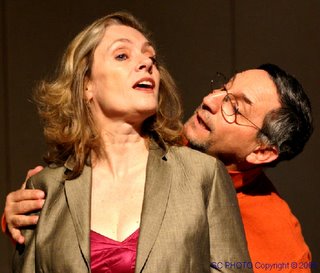Last November I was asked by Jennie from Actors' Shakespeare Project to take photos for their production of Twelfth Night. I went one afternoon for about 30 minutes to work with three actors while they rehearsed in front of me. These were good actors. Even though they had not started rehearsing until late that day, they fit into their roles right away. They started from reading their lines from different prints of Twelfth Night, and then loosened up. I walked around taking pictures from far and close (using a prime lens), and found that shooting in RAW mode slowed down my camera a lot.
The company used one of the photos online for their ticket sales, and they printed three photos in their program with my name listed on the side. It made me feel so accomplished. I was also invited to see the play for free. Thursday night (eleventh day after Christmas!) I went with some friends for an evening of merry-making.
The performance was at Cambridge Multicultural Center, a small and intimate place. There were about 120 seats and it was a sold-out show. There were two musicians playing live music before and during the show. I really liked the duet between the piano and the cello.
The story of Twelfth Night is about a love triangle. A young lady, Viola, was shipwrecked and washed ashore to a foreign kingdom. In order to survive, she disguised herself as a boy named Cesario and joined Duke Orsino’s court. The Duke was in love with the Countess Lady Olivia, who refused all her suitors insisting that she was in mourning of her dead brother and would not marry for seven years. Viola/Cesario, who soon became the Duke’s favorite, was sent to the Countess by the Duke to deliver his love letter and to woo her. In stead, the Countess fell in love with the beautiful young Viola/Cesario, but the latter found herself in love with the Duke. Everybody was miserable.
Shakespeare was Shakespeare. The love triangle was resolved because Viola had a twin brother, Sebastian, who also survived the shipwreck, though neither of the twins knew the other one had survived. After a lot of mistaken identities and unrequited love, everybody settled down in the end: the Countess married Viola’s brother, and Viola revealed her true identity and married the Duke. It is a happy ending after all.
It is a funny comedy. But then you think about the story again and it feels kind of weird. Do you love someone just for one’s looks? If not, how could the Countess readily marry Viola’s twin brother? If you are straight, can you find someone of your own sex so attractive that if he/she were the other sex that you’d marry her/him? Is romantic love really so shallow?
By the way, my friend S, the newly appointed assistant professor of Renaissances at Wellesley College, really liked this production. S graduated from Harvard and she herself is an expert on Shakespeare. She speaks highly of Actors’ Shakespeare Project.


No comments:
Post a Comment